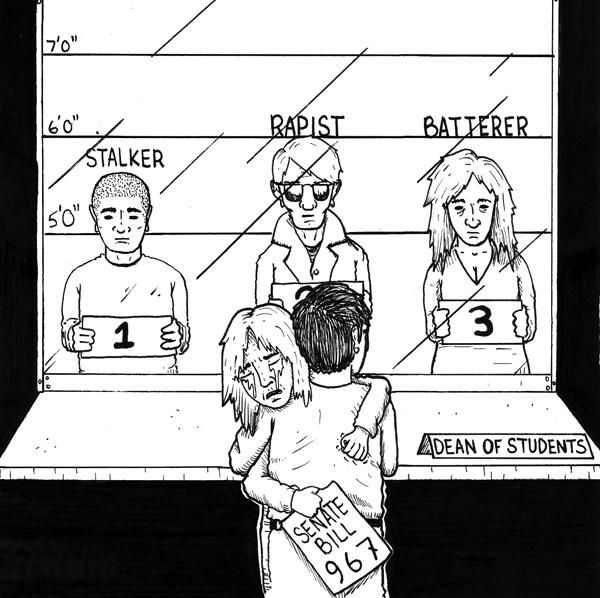No does not mean yes
Push to alter college sexual assault policy
Sep 24, 2014
A new piece of legislation to be added to the California Ed Code currently stands before Gov. Jerry Brown to either be signed into law or vetoed into the history books.
Senate Bill 967, if passed, will require colleges in California that receive state funding for student financial aid to install a standardized procedure for handling and investigating cases involving sexual assault, domestic violence, dating violence and stalking.
It will also require these colleges to install and advertise outreach and prevention programs for victims of such cases, as well as inform respective campus student communities of their rights and responsibilities under the new law.
Sex crimes that happen on campus, or anywhere for that matter, are of an extremely serious nature.
While many sexual assaults go unreported, those that do show startling statistics.
In a White House report on sexual assault issued in April, President Barrack Obama said recent research has shown one in five women will be sexually assaulted during their time in college.
And according to a study conducted by the Education Department this year, sexual crimes are up by roughly 52 percent in comparison to a decade ago.
Senate Bill 967 is necessary to reduce the number of college students seeking sexual encounters while under the influence of mind altering substances.
Before students would legally be allowed to participate in a sexual act with one another, all individuals involved would be responsible for receiving an act of “affirmative consent,” verbal or non-verbal, from the other party.
This will reduce sexual assault cases by forcing students to make sure he or she wants to have sex with him or her.
A no never means yes. Yes means yes.
By putting the responsibility of gaining “affirmative consent” on the individuals involved in a sexual crime case, investigators will be able to determine if any laws, determined by the Ed Code, are broken in the process.
The law would be a powerful tool in the arsenal of the sexually assaulted.
And while a lot of people here at Contra Costa College would agree, The Advocate included, that the law is a huge move forward for the rights and protection of sexual assault victims, this is a pivotal moment for our college.
If CCC administration, staff and faculty fail to properly educate the student body on the changes to students’ rights and responsibilities under the new law, there will be potential for disaster.
One wrongfully accused and convicted student of a sexual assault crime would be one too many, and the parameters defined by this law leave little room for argument. The Senate bill, however, is positive and will create a safety net for sexual assault victims.
This net must be tightly stitched.


